Clockwise: Posters from The Gay Divorcee; Gold Diggers of 1935; Swing Time; Waikiki Wedding; and The Big Broadcast of 1938.
To mark the occasion o the Academy Awards tonight, I thought I would take a look back at the first five winners of the Academy Award for Best Original Song. The Academy Awards began in 1929, a small brunch of industry bigwigs patting themselves on the back. There was no surprise that first year, as the winners were announced a few months prior. That was changed for the second ceremony, where the winners were announced from the podium. The early ceremonies mostly recognized the actors, directors and producers. Once again, things changed in 1934, the first year the music was recognized. In fact, two awards were given, for 'Best Original Song' and for 'Best Score'. For the purposes of this celebration, we will just be looking at the 'Best Original Song' winners. The very first winner of the Academy Award for Best Original Song was "The Continental" from 'The Gay Divorcee'. The movie featured Ginger Rogers and Fred Astaire, and several beautiful dance numbers. The biggest dance was for this song, with music by Con Conrad and lyrics by Herb Magidson, although it was heard as an instrumental on screen. "The Continental" was both a song and a swing dance, but more of an exhibition dance than a dance craze. Watch and enjoy "The Continental" from 'The Gay Divorcee'.
The next year, the Academy Award went to a song that was a classic in the making. Not only did it charm in this original version, it went on to be sung by many through the years, it also went on the have live afterwards on the Broadway stage. The 1935 Academy Award for Best Original Song went to "Lullaby of Broadway", the huge musical number from 'Gold Diggers of 1935'. With music by Harry Warren and lyrics by Al Dubin, the song was perfect for production values of Busby Berkeley, whose imaginative choreography and direction made magic. Forty-five years later, Gower Champion brought '42nd Street' to the Broadway stage, featuring the music of Warren and Dubin. One of the big numbers from the show was "Lullaby of Broadway", first sung by the late Jerry Orbach. But it was Wini Shaw who had the honors in the original film, so please enjoy "Lullaby of Broadway".
The next winner is another classic, sung by many, from Bing Crosby to Billie Holiday to The Jaguars to The Letterman to Tony Bennett and so many more. But the song, with music by Jerome Kern and lyrics by Dorothy Fields, began as a sweet love song in the movie 'Swing Time'. I would say it was a simple beginning, but anytime a song is introduced by Fred Astaire in a film with Ginger Rogers, simple doesn't seem to apply. Such is the case with "The Way You Look Tonight", a song even lyricist Fields said "The first time Jerry played that melody for me I went out and started to cry. The release absolutely killed me. I couldn't stop, it was so beautiful." Watch and listen as Astaire delivered "The Way You Look Tonight".
I have to say, this next winner owes a great deal to finding the perfect performer as it does anything else. 'Waikiki Wedding' was a tropical musical, set on beautiful Hawaii. It starred Bing Crosby and the dashing male lead, opposite Shirley Ross. The cast also included Martha Raye and Bob Burns as the second leads, and comic relief. It was Crosby who delivered the 1937 winner of the Academy Aware for Best Original Song, "Sweet Leilani". It was written by Harry Owens, a composer born in Nebraska. He was a bandleader, and in 1926 took up residence at the Lafayette Cafe in Los Angeles. It was there he auditioned and first started working with a young singer named Bing Crosby. A few years before the film, Owens had moved to Hawaii, and was named music director of The Royal Hawaiian Hotel in Waikiki. On vacation before shooting 'Waikiki Wedding', Crosby visited his friend, and heard the orchestra play a song Owens had written for his daughter, Leilani. Bing loved it, and wanted to use it in his upcoming film. And it went on to win the Oscar. Enjoy the scene from the movie 'Waikiki Wedding'.
The fifth winner of the award is another song that went on to become a classic. Although 'The Big Broadcast of 1938 starred W.C. Fields, Martha Raye and Dorothy Lamour, the song was not sung by one of these big stars. Instead, "Thanks for the Memory" was sung by one of the comics, a young Bob Hope. The song, with music by Ralph Rainger and lyrics by Leo Robin, went on to be the signature song for the comedian, which he performed at the end of his shows. I hear it, and I instantly think of Hope, whose television specials and work with the USO I remember so well. In fact, I am not sure I have ever seen the original movie, even though this song is such a strong memory. In the clip from the movie, see Hope sing the song with costar Shirley Ross in 'The Big Broadcast of 1938'.
Enjoy the 2013 Oscars!

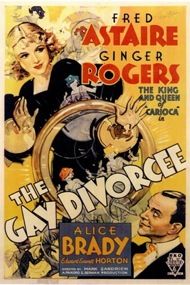
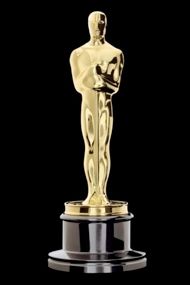
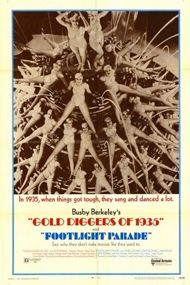
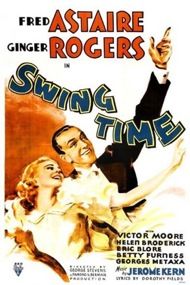
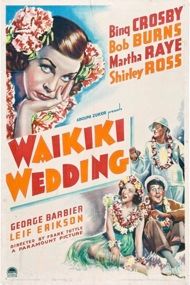
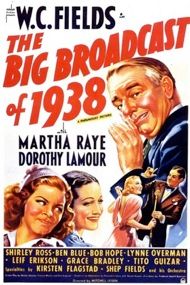
No comments:
Post a Comment